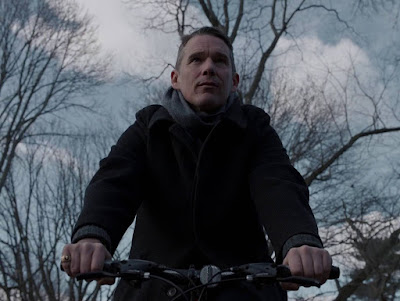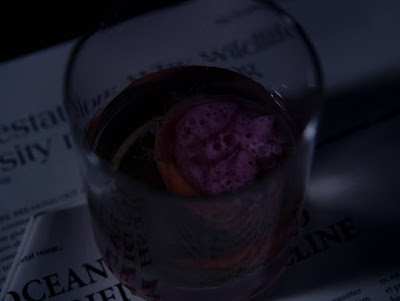Three screens from Paul Schrader's new picture, First Reformed. The film debuted in the USA last year at Telluride and has a Blu-ray debut next week on the Lionsgate label. It played the NZIFF last month and is playing in Melbourne IFF. I cannot ascertain any other Oz playdates with certainty. It has been doing a number of streaming platforms which is how I have managed to see it for this review.
 |
| Ethan Hawke, First Reformed |
The movie is Schrader's finest work since Light Sleeper and before that, Mishima. The first hour is composed of sparsely dressed, furnished and precisely framed sets with shots that are so intensely tuned, held and doted on that the accumulation of them for the entire first half of the movie takes on an extraordinary sense of exhilaration.
Each shot is so powerfully precise in its range of meanings, shot by shot it has the power to confound your expectations for every following shot. I cannot think of a movie that infuses so much power into its montage (which is to say virtually its entire mise-en-scène) since Kubrick and Eyes Wide Shut, in which single shots, whether static or mobile deny the viewer any certainly whatsoever about what's to come next.
 |
| First Reformed |
Schrader's method here, with the faultless participation of his cast, including a career high for Ethan Hawke, is to intertwine an unfolding narrative with parallel self-reflection through both a diary and voice over, just as he has previously in his script for Taxi Driver, and in Light Sleeper. The opening of course immediately references Bresson's Journal d'un Curé de Campagne and the movie's emotional life is totally indebted to that masterpiece.
The second hour takes the picture into other levels of both reality and consciousness, allowing for several possibilities including an astonishing and startling multiple ending which is itself unresolved.
 |
| Amanda Seyfried, Ethan Hawke, First Reformed |
Your feelings about the success or otherwise of Schrader's strategy for the climax is as much dependent on the success with which he carries you emotionally in the character's direction. As the great stylist he is, it is simply impossible not to feel empathy, not only with Hawke's pastor, Ernst Toller (another major reference), but with every actor in the movie, even the amazingly straight faced performance by Cedric Kyles (aka "The Entertainer") as the head of the umbrella mega-church under whose corporate wealth, Toller's/Hawke’s petite 250 year old white Shaker weather board church with almost no parishioners is permitted to survive.
So Schrader at 72 has pulled rabbits out of hats. One of them, the most surprising to me, is the discovery that his leading character is not indeed the “loner” of so many earlier Schrader films, but a genuine everyman. Without giving away spoilers I feel as though the amazing climax is as much an extension of the singular to the encompassing, complete with dual expressions of Christ and Satan.
This is as powerful as anything I have watched in the last twelve months, and formally at least, even the ambivalences which he purposely inserts into structure and filming from what in otherwise conventional terms might have been called a third act is itself the sort of exhilaration which a movie can rarely communicate with you. Indeed, Toller himself records the same reviving excitement in his diary after first meeting the young Eco activist.
The world may have no future, and no future for those of us who are currently destroying it at fearsome speed. I implore everyone to see and if possible buy First Reformed from one of the current masters of English language cinema. Nobody capable of rational thought can be unmoved or unprovoked by it.
 |
| Paul Schrader |
No comments:
Post a Comment
Note: only a member of this blog may post a comment.